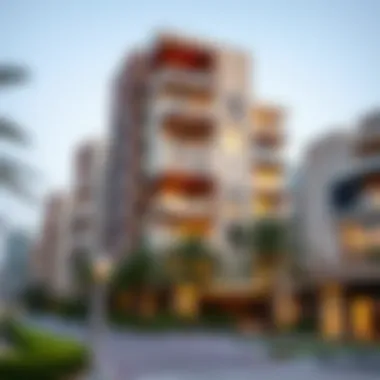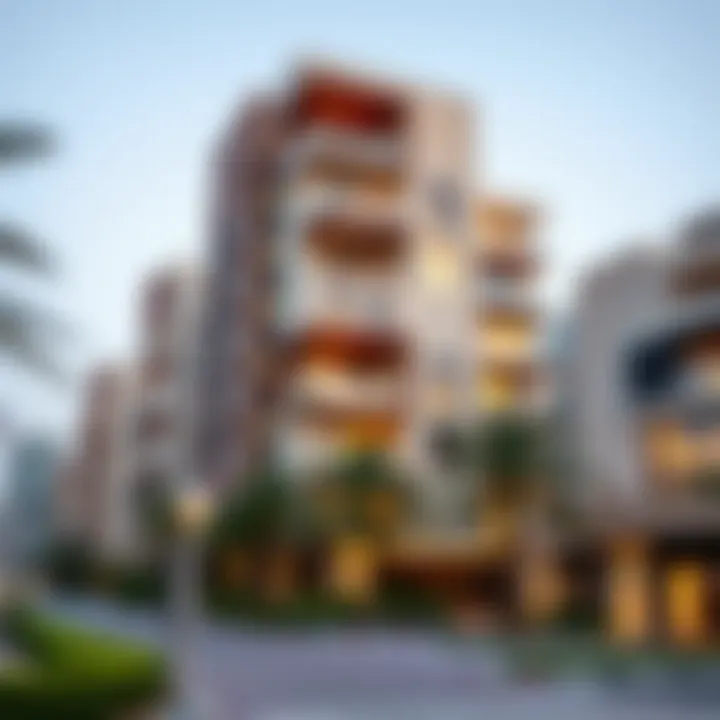Navigating the Simple Real Estate Landscape in Dubai


Intro
Dubai’s real estate market has become synonymous with luxury and innovation. But beyond the glitz and glamour lies a complex tapestry of trends, opportunities, and challenges waiting to be unraveled. This guide aims to provide potential homeowners, investors, agents, and even analysts with a clearer view of what to expect in this dynamic landscape.
Understanding the intricacies of Dubai's real estate sector is crucial, considering the rapid changes that occur with each passing year. The combination of an ever-growing population, a booming tourism sector, and strategic governmental initiatives mean that grasping the basics of property types, investment methods, and market trends will ultimately lead to informed and sagacious decisions.
But how does one navigate such a bustling environment? Are there distinct property types to steer clear of? Or is there knowledge around market forecasts that can give an edge in negotiations? This article sets out to highlight the essential elements and provide insights that will be beneficial for anyone thinking about diving into the vibrant Dubai real estate scene.
Preamble to Simple Real Estate
Understanding the dynamics of real estate may appear straightforward at first glance, yet navigating its complexities in a place like Dubai reveals a tapestry of opportunities and challenges. The nuances of simple real estate—defined by clear, uncomplicated principles—serve as the bedrock for both seasoned investors and novice homebuyers alike. This article seeks to unravel various aspects that define simple real estate and to highlight its pivotal role in the context of Dubai.
When it comes to Dubai's vibrant property market, simplicity is not just about the absence of complications; rather, it encompasses the comprehension of fundamental elements such as property types, market trends, and investment strategies. An informed perspective on these can significantly enhance decision-making.
Defining Simple Real Estate
While the term might imply minimalism, simple real estate embodies core principles that all stakeholders should grasp. It refers primarily to straightforward property concepts that can be easily understood. This includes basic categorizations—like residential versus commercial properties—and the foundational elements that dictate successful transactions. Investors can simplify their decision-making by focusing on key aspects like location, price trends, and property functionality.
In practice, defining simple real estate can manifest in various forms:
- Residential Properties: Homes designed for living, like apartments, townhouses, and villas.
- Commercial Properties: Spaces utilized for business operations, including office units and retail locations.
A pragmatic comprehension of these definitions forms a solid footing in the larger scheme of Dubai's real estate landscape, allowing individuals to identify which niches align with their goals.
The Importance of Real Estate in Dubai
The real estate sector in Dubai acts as a catalyst for economic development. Given its strategic geographical positioning and a thriving tourism sector, the property market becomes a microcosm of innovation and growth. Whether viewed through the lens of investment potential or the drive towards establishing a residence in a cosmopolitan ambiance, the significance of real estate is pronounced.
Several factors enhance the importance of real estate in Dubai:
- Economic Diversification: The sector plays a crucial role in moving beyond oil dependence, fostering a robust economy.
- Cultural Melting Pot: With diverse populations residing in the city, properties cater to a wide range of preferences, thus fueling demand.
- Global Investment Hub: Dubai is often viewed as a sought-after destination for international investments, providing various opportunities for foreign buyers and investors.
*"Real estate isn't just about land; it's about community, culture, and the creation of value for future generations."
As such, understanding Dubai's real estate landscape is imperative—not merely as a personal endeavor but as a broader understanding of economic trends and community dynamics.
Understanding Property Types
In the realm of Dubai's real estate, grasping the nuances of property types is vital for investors, homeowners, and market analysts alike. Each property type carries its unique characteristics, benefits, and considerations, which can significantly impact the buying or leasing decisions. Spending time to understand these distinctions can lead to more informed choices that align with financial goals. Additionally, recognizing what each type can contribute to one’s portfolio or lifestyle can provide a strategic edge in navigating the vibrant real estate landscape.
Residential Properties
Villas
Villas are often viewed as a hallmark of luxury living in Dubai. Characterized by their spacious layouts and private gardens, these properties offer an attractive choice for families seeking a comfortable living environment. A villa's key characteristic lies in its independence; owners typically enjoy more privacy and space compared to other residential types. This makes villas a popular option, especially among expatriates and affluent locals who desire a serene atmosphere amidst the city's hustle.
A notable feature of villas is their potential for expansion or custom renovation, allowing homeowners to truly make the space their own. However, maintenance can be a double-edged sword; while the privacy is a selling point, keeping up with garden and pool upkeep can prove to be a hassle.
Townhouses
Townhouses combine the benefits of both single-family homes and condominiums. These properties are designed in a row, resembling attached homes but providing more space than an apartment. The unique structure of townhouses usually lends itself to a community feel, making them a favorable choice for those looking for a close-knit neighborhood.
Furthermore, townhouses often come with shared amenities such as pools or gyms, adding value without the hefty price tag of a standalone villa. On the downside, they may offer less privacy than villas or separate homes since they share walls with neighbors, leading to noise concerns.
Apartments
Apartments in Dubai vary widely in size and style, making them versatile options for a diverse array of residents. Ranging from studio flats to high-end penthouses, they cater to single professionals, small families, and investors alike. The main characteristic that sets apartments apart is their communal living aspect, with shared facilities that often include gyms, pools, and concierge services.
The appeal of apartments primarily lies in their affordability compared to villas and townhouses, particularly in prime locations. However, this convenience comes at a price; potential buyers or renters should be aware of the possibility of less living space and privacy. The ongoing trend of upscale developments has also raised prices in sought-after areas, making them less accessible to budget-conscious individuals.
Commercial Properties
Office Spaces
When delving into the commercial sector, office spaces are the foundation upon which businesses flourish. In Dubai, where the business environment is constantly evolving, having the right office space can make or break a venture. The versatility of office spaces ranges from traditional layouts to more modern co-working hubs, reflecting the dynamic needs of businesses today.
A crucial benefit of investing in office spaces is the potential for long-term rental income, especially in growth areas like Business Bay or Dubai Marina. However, the dependency on market fluctuations can pose risks, and high upkeep costs can eat into profits.
Retail Units
Retail units play a critical role in Dubai’s economy, catering to both local and international consumers. These properties include everything from standalone shops to units within major malls. The attractiveness of investing in retail units lies in their ability to generate consistent foot traffic, particularly in tourist-heavy areas.
Among the unique features is the opportunity for stock growth; as consumer trends shift, the potential for profitability increases. However, the competitive nature of retail in this bustling city requires astute market awareness and a strong business plan to mitigate potential downsides.
Industrial Properties


Industrial properties form the backbone of logistics and supply chain management. They encompass warehouses, factories, and distribution centers, making them essential for businesses involved in heavy manufacturing or logistics services. The key characteristic of these properties is their functional design, purposefully built to cater to the operational needs of businesses.
Investing in industrial properties can indeed offer substantial returns, especially given Dubai’s strategic location as a global trade hub. Nevertheless, potential investors should weigh the risks involved, as market demands can swing drastically, affecting occupancy rates and profitability.
Understanding the types of properties available and their unique features allows investors and buyers to navigate Dubai’s real estate landscape more effectively.
Investment Strategies in Real Estate
Investment strategies in real estate are pivotal—it’s like mapping out the best path in an intricate city. Understanding various approaches helps investors to navigate the market's twists and turns effectively. In a vibrant market like Dubai, where opportunities abound, carefully curated strategies can be the key to financial success. The stakes are high, and the consequences of missteps can be substantial. Therefore, comprehending these investment strategies offers a clearer vision of how to engage with this dynamic landscape.
Long-term vs. Short-term Investments
When considering real estate investments, one of the first forks in the road is choosing between long-term and short-term strategies. Long-term investments often involve buying properties with the expectation that their value will appreciate over time. Investors benefit from steady rental income and capital gains, creating a reliable income stream. This approach is more like planting a seed—nurture it, and over years, it can grow strong and yield plenty. In Dubai, with various residential and commercial properties available, this strategy aligns well with those looking for stability.
On the flip side, short-term investments, sometimes referred to as speculating, involve flipping properties for quick gains. This strategy demands a keen eye for trends and market conditions. It’s a roll of the dice, yet the rewards can be significant if executed correctly. Investors can purchase undervalued properties, refurbish them, and sell at a profit within a few months. However, as bubbling as excitement might be, it’s essential to keep a level head—market volatility can quickly turn profits into losses.
Rental Properties as Investment Vehicles
Diving into rental properties as investment vehicles is a savvy option for many investors. This strategy involves purchasing properties and leasing them out, thereby generating income while the property appreciates in value. The beauty of rental properties lies not just in the consistent cash flow; they also provide a hedge against inflation. As rental demand soars in Dubai, especially in popular areas, landlords have the potential for lucrative returns.
However, being a landlord isn't without its own set of challenges. From maintaining the property to dealing with tenants, workload can fluctuate considerably. It’s advisable to conduct comprehensive market research to identify neighborhoods with high rental demand—areas where tenants are as plentiful as sand grains on a beach.
- Consider location: Proximity to schools, malls, and public transport enhances rental desirability.
- Analyze local trends: An understanding of vacancy rates and average rental prices helps in forecasting potential income.
Flipping Properties
Flipping properties is like racing against the clock. This investment strategy centers on purchasing properties, usually at a lower price, making upgrades, and selling them off for a profit—all within a short timeframe. In the bustling Dubai market, this can be both an enticing and risky venture. Success largely hinges on timing and understanding local market dynamics.
Investors need to be astute—sort of like a hawk surveying the terrain. They must identify underappreciated properties, assess renovation costs, and predict the selling price post-renovation accurately. Some potential pitfalls to be wary of include:
- Market fluctuations: Rapid changes in property values can erode expected profits.
- Renovation costs: Unexpected expenses can crop up during renovations, potentially souring the deal.
- Timing the market: Knowing when to sell can mean the difference between a profit and a loss.
Ultimately, flipping properties can indeed yield quick returns, but doing your homework and engaging in thoughtful planning cannot be overstated.
The key to success in real estate investment lies not in luck but in informed decision-making based on thorough research and strategic planning.
Market Trends to Monitor
Understanding market trends is fundamental for anyone keen on the Dubai real estate scene. Being abreast of the latest trends not only provides insight into potential investment returns but also helps in making informed decisions about buying or selling properties. Trends can influence prices, demand, and the overall market health, which are crucial for anyone involved, be it investors, homebuyers, or agents. Keeping a finger on the pulse of the evolving landscape can mean the difference between seizing a great deal and letting it slip through your fingers.
Current Trends in Dubai's Real Estate Market
Dubai's market is a unique beast, characterized by rapid changes and innovative developments. Recently, there has been a noticeable shift towards sustainable housing and smart technology integration. Many new projects are designed not just with luxurious elements but also with ecological concerns in mind. For instance, properties in areas like Dubai South are increasingly featuring eco-friendly materials and energy-efficient systems aimed at reducing carbon footprints. This transition attracts environmentally conscious buyers and investors looking for long-term value.
Moreover, the demand for affordable housing has risen significantly. With more professionals moving to Dubai, there's a necessity for housing options that cater to diverse income levels. The government has imposed various initiatives to support affordable housing projects, a trend that bodes well for both developers and buyers alike. Similarly, off-plan properties have gained traction, as buyers are often enticed by the lower initial prices and the potential for property value appreciation by completion.
"Understanding and adapting to current trends is vital for staying competitive in Dubai's dynamic real estate market."
Additionally, the short-term rental market, particularly in tourist-favored neighborhoods, has seen a spike. This aligns with Dubai’s growing appeal as a global travel hub. Investors looking for passive income are increasingly turning to platforms like Airbnb to capitalize on the influx of tourists.
Impact of Global Economic Factors
The real estate market in Dubai is not insulated from global economic fluctuations. Economic conditions in Europe and North America, for instance, have direct implications on the demand for properties in Dubai. When economies in these regions thrive, the flow of expatriates and foreign investors into Dubai often increases, driving demand for housing and commercial properties.
Conversely, downturns can lead to a decrease in property values and rental yields. It's important to watch the currency exchange rates as well; fluctuations can either make Dubai’s properties more affordable for foreign buyers or push them out of the market altogether.
Another critical global factor is the rise of remote work. The pandemic has shifted many people’s perspectives on where they want to live and work. As remote work becomes more commonplace, some might opt to move to Dubai's warm climate and vibrant lifestyle, further increasing housing demand. This interest highlights the potential for long-term growth in areas that are appealing to these remote workers.
Lastly, the global push towards investing in technology is impacting the real estate market significantly. Proptech has streamlined property management, made investment analysis more accessible, and allowed buyers to view properties virtually, which enhances overall market efficiency.
Simply put, keeping an eye on these factors can illuminate potential risks and opportunities in the market, making it essential for all stakeholders to stay informed.
Financing Options for Real Estate
In the realm of real estate in Dubai, understanding financing options is pivotal. The choices investors and homebuyers make regarding financing can significantly affect their overall experience and return on investment. With Dubai's rapidly changing property landscape, being well-informed about the various methods of financing ensures that decisions are not only timely but also financially sound. This section explores traditional mortgages and alternative financing methods, highlighting the benefits and unique aspects of each to help guide potential buyers and investors in their financial journey.
Traditional Mortgages
Traditional mortgages represent one of the most familiar financing options available for those looking to purchase property in Dubai. These loans are typically offered by banks and financial institutions, allowing buyers to borrow a certain percentage of the property's value, usually ranging from 70% to 85%, with the remaining amount covered by a down payment.
- Loan Tenure: Mortgages can be structured over various periods, commonly from 5 to 30 years. Longer terms generally lead to smaller monthly payments, albeit higher overall interest amounts.
- Interest Rates: The interest on these loans can be fixed or variable, affecting monthly payments and the total cost of the loan. For instance, while fixed rates offer predictability, variable rates may present opportunities for lower payments depending on market trends.
- Eligibility: Banks typically assess the borrower’s creditworthiness, employment stability, and income levels, ensuring that the individual is capable of upholding the financial commitment.
The predictability and regulatory backing of traditional mortgages can provide peace of mind for investors. By navigating the terms set by financial institutions, individuals can find a mortgage plan that best fits their budget and long-term goals.


"Understanding the landscape of financing options is more than just numbers; it’s about aligning them with your financial vision."
Alternative Financing Methods
While traditional mortgages may suit many, alternative financing methods can open doors for those seeking flexibility or unique opportunities in Dubai's real estate. These methodologies often bypass conventional banking and can cater to a wider array of situations.
Some notable alternatives include:
- Private Loans: Borrowing from private lenders can be advantageous for those who need quicker access to funds or may not qualify for traditional financing. These loans can come with higher interest rates and shorter terms, but they often have less stringent application processes.
- Rent-to-Own Schemes: In this arrangement, buyers rent a property for a specified period with the option to purchase it later. Monthly payments typically contribute to the eventual purchase price, allowing individuals to build equity without an immediate financial burden.
- Crowdfunding: Real estate crowdfunding has gained traction among investors who want to pool their resources in a collective investment. This method allows individuals to invest smaller amounts in larger properties, diversifying portfolios without excessive upfront costs.
- Islamic Financing: In a cultural context, many opt for Islamic financing methods that comply with Sharia law. These include profit-sharing arrangements or leasing structures, allowing for ethical investing aligned with specific beliefs.
Overall, alternative financing methods introduce varied pathways that can be tailored to fit specific needs. By examining these options alongside traditional mortgages, investors can form a comprehensive approach to financing their real estate ventures in Dubai.
Navigating the Legal Landscape
Understanding the legal landscape in Dubai's real estate market is of utmost significance for anyone looking to invest, buy, or sell property. The unique legal framework of the Emirates is designed to protect the interests of both buyers and sellers, but it can also be complicated. With various laws, regulations, and practices in place, navigating this environment can be tricky but crucial. An in-depth comprehension of property laws helps avoid pitfalls that could lead to serious financial losses or legal issues. Whether you're a seasoned investor or a first-time homebuyer, acknowledging these legalities establishes a solid foundation for any real estate transaction.
Understanding Property Laws in Dubai
Dubai’s real estate laws provide clarity and security to all parties involved. The real estate landscape is primarily regulated by the Dubai Land Department, which ensures lawful transactions and property ownership rights. One key thing to note is the difference in ownership rights for local and expatriate buyers.
Expatriates can own property in designated areas known as freehold plots. These areas include significant developments such as Dubai Marina and Downtown Dubai. Local buyers, on the other hand, have the option to acquire property in designated zones not limited to freehold ownership.
Some additional crucial elements include:
- Title Deed Registration: It’s crucial to have the title deed registered with the Dubai Land Department. This document forms the basis of ownership, proving your legal entitlement to the property.
- Property Law Number 7 of 2006: This law further outlines the rights and obligations of property owners and how real estate transactions should be conducted. Understanding this law can aid in grasping your legal standing better.
- Strata Title Law: Pertinent to properties such as apartments or villas in a community, this legislation governs shared ownership and responsibilities within a community.
Navigating these laws requires understanding their intricacies. Lacking this wisdom may lead to challenges, such as ownership disputes or non-compliance issues, which could be a headache down the line.
Contracts and Agreements
Contracts are at the heart of any real estate transaction. It's not just about buying or selling a property; it’s about hashing out the terms. This involves binding agreements that legally obligate the parties to certain responsibilities and conditions. In Dubai, having a strong grasp of different types of contracts can make or break your experience.
When entering into agreements, here are a few things that should be on your radar:
- Sale and Purchase Agreements (SPA): This contract outlines the specifics of the sale, including the purchase price, payment terms, and conditions for transferring ownership. Ensure all details are clear to prevent misunderstandings.
- Lease Agreements: For those investing in rental properties, a well-drafted lease agreement protects both the landlord and tenant, detailing rights, duties, duration, and rent increases.
- Due Diligence Clauses: These clauses protect buyers by allowing time to evaluate the property’s documents, terms, and state before finalizing the deal.
It's always advisable to have a qualified legal professional review any contracts. That way, not only can they spot potential red flags, but they also provide guidance on compliance with local laws.
"Understanding the legal framework in Dubai's real estate market is not just a precaution; it's an essential part of a successful investment strategy."
With a deep comprehension of property laws and an attention to detail concerning contracts and agreements, you can navigate the real estate landscape in Dubai more confidently. This knowledge empowers potential investors and homeowners and helps clear the path to successful property transactions in one of the most dynamic markets in the world.
For more resources on real estate laws, please refer to the following links:
Real Estate Agents and Their Role
In the bustling realm of Dubai's real estate market, the role of agents cannot be overstated. They serve as the bridge that connects buyers and sellers, facilitating transactions and providing insights that are vital for navigating this dynamic landscape. Having an adept real estate agent by your side is akin to having a skilled navigator on a ship, ensuring smooth sailing through often turbulent waters.
Choosing the Right Agent
When it comes to selecting a real estate agent, matching personal preferences with professional capabilities is crucial. Here are a few aspects to ponder when hunting for the right fit:
- Experience and Specialization: Look for an agent who specializes in the type of property you are interested in, whether it be residential or commercial. Experience speaks volumes, especially in a market as unique as Dubai's.
- Knowledge of the Local Market: A well-versed agent knows neighborhoods like the back of their hand. Familiarity with local amenities, schools, and even the whisperings of upcoming developments can make or break your investment.
- Reputation and Client Feedback: Reviews and testimonials are a treasure trove of information. A solid reputation often indicates a reliable agent who values transparency and client satisfaction.
- Communication Style: An agent’s ability to communicate effectively is paramount. They should be accessible and willing to answer questions, making the entire process less daunting.
In essence, picking the right agent can significantly influence your real estate journey. Take your time, do your homework, and don’t hesitate to interview a few before making your final choice.
The Value of Professional Guidance
Engaging a qualified real estate agent brings a cornucopia of benefits. Here are just a few:
- Expert Negotiation Skills: Professional agents are seasoned negotiators. They know the ins and outs of deals and can often secure better terms and prices than an untrained buyer might achieve on their own.
- Access to Listings: Agents often have access to exclusive listings before they hit the market, giving you the upper hand in finding properties that meet your criteria.
- Streamlined Process: The real estate process can be rife with complexities. An agent simplifies this journey, helping you to navigate paperwork, inspections, and legalities without getting bogged down.
- Networking Opportunities: Real estate agents often have a network of industry contacts, including lenders, contractors, and inspectors, which can be invaluable to you as a buyer or seller.
Analyzing Neighborhoods
Analyzing neighborhoods is a critical step for anyone stepping into Dubai's bustling real estate market. This element of real estate is not solely about the physical attributes of property but extends to understanding the surrounding environment. A neighborhood can dictate the quality of life, potential for appreciation, and overall investment returns. With diverse communities within Dubai, recognizing what each area offers can greatly influence buying decisions, shaping your future in this vibrant city.
Neighborhood analysis in Dubai is analogous to inspecting the bones of a structure before purchasing; without this due diligence, you might end up with a property that's more trouble than it’s worth. Buyers and investors ought to dig deeper beyond flashy marketing. Between the glittering skyscrapers lie neighborhoods with distinct characters, and it’s these nuances that require a keen eye.
Criteria for Evaluating Neighborhoods
When evaluating neighborhoods in Dubai, several criteria come into play. Here are key factors to consider:


- Accessibility and Connectivity: Look at the proximity to main roads, public transport, and airports. Areas like Downtown Dubai and Dubai Marina offer excellent connectivity, boosting convenience for residents and businesses alike.
- Amenities and Services: Nearby amenities such as schools, hospitals, shopping malls, and entertainment options can significantly affect desirability. For instance, community hubs like Jumeirah Beach Residence are appealing due to the vast choices of retail and dining.
- Future Development Plans: Investigate potential infrastructure projects or urban developments slated for an area. The Dubai government's announcements regarding new schools, parks, or transportation lines can signal growth and increased property values in the future.
- Demographics and Community Profile: Understanding who lives in the neighborhood helps gauge if it meets your lifestyle or investor goals. Areas such as Arabian Ranches attract families, while urban locales like JLT tend to draw the young professional crowd.
- Security and Crime Rates: Safety is paramount. A neighborhood with low crime rates fosters peace of mind, encouraging homebuyers to invest without apprehension.
- Market Trends: Examine historical price movements and rental yields to anticipate future performance. Knowledge of older versus emerging neighborhoods can guide in making investment decisions.
Analyzing these criteria not only helps buyers pick the right property but also informs investment strategies, providing a well-rounded understanding of the market.
Emerging Hotspots in Dubai
As the economic landscape of Dubai evolves, certain neighborhoods have emerged as promising investment hotspots. Staying updated on these can set an investor ahead of the curve.
- Dubai Silicon Oasis: Nestled on the outskirts, this area is becoming a hub for tech companies and startups, making it attractive for young professionals. The potential for high rental yields here is noteworthy.
- Mohammed bin Rashid City: Combining residential, commercial, and retail, this area is under development with luxury offerings that appeal to affluent buyers. With parks and leisure spaces, it caters well to families.
- Dubai South: Intended to support the Expo 2020 legacy, this area is predicted to grow significantly. The planned residential units and well-connected infrastructure point to bright opportunities ahead.
- Jumeirah Village Circle (JVC): Known for its affordable housing and community feel, JVC is on the rise as more families seek residency in Dubai. Its accessibility to key attractions boosts its appeal.
- Al Furjan: This area is gaining attention for its mix of affordable villas and townhouses. With current development projects promising to elevate its status, it's a location to watch.
Sustainability and Real Estate
As the global conversation shifts towards eco-friendly living, the topic of sustainability in real estate has become more important than ever. This section of the article will explore the significance of integrating sustainable practices in Dubai's vibrant real estate market. Not only do these practices align with the broader movement towards environmental responsibility, but they also offer numerous benefits for investors, homebuyers, and developers alike.
The Growing Trend of Eco-Friendly Properties
The demand for eco-friendly properties is on the rise in Dubai, reflecting a growing consciousness about environmental issues among consumers. Homebuyers and investors are now actively seeking out properties that incorporate sustainable practices. This trend is shaped by several factors:
- Energy Efficiency: Many new buildings are designed with energy-saving technologies, such as solar panels and high-performance insulation. This results in lower utility costs and a reduced carbon footprint.
- Water Conservation: Properties incorporating greywater recycling systems and smart irrigation methods appeal to buyers interested in sustainability. Such features are not only environmentally friendly but can also yield significant savings on water bills.
- Healthier Living Environments: Eco-friendly homes often use non-toxic materials and better ventilation systems, which lead to improved indoor air quality. Many buyers recognize that living in a healthier environment can have profound impacts on their well-being.
The trend towards eco-friendly properties goes hand in hand with the ongoing UAE vision for sustainable development, showcasing a commitment to maintaining a balance between growth and ecological considerations.
Government Initiatives for Sustainability
The role of government in promoting sustainability within real estate cannot be understated. In Dubai, the government has taken significant steps to foster an environment conducive to sustainable building practices. Some key initiatives include:
- Green Building Regulations: The Dubai Municipality has implemented regulations promoting sustainable practices in construction. This includes laws that require new buildings to meet specific environmental standards.
- Incentives for Developers: Financial incentives are offered to builders who integrate sustainable technologies into their projects. This not only encourages the construction of eco-friendly homes but also creates a more competitive real estate landscape in Dubai.
- Sustainable Urban Development Policies: The government has outlined policies aimed at creating mixed-use developments that blend residential, commercial, and recreational spaces while minimizing environmental impact.
According to recent data, investments in sustainable properties have been shown to yield higher long-term returns, illustrating the economic viability of this approach.
In summary, the emphasis on sustainability within Dubai’s real estate market reflects a broader shift in consumer preference and government policy aimed at creating a more sustainable future. For investors and developers, aligning with these trends ensures they are not only meeting market demands but also contributing to the well-being of the community and the planet.
The Future of Real Estate in Dubai
The future of real estate in Dubai stands at a fascinating crossroad. As one of the most dynamic and fast-paced markets in the world, it exhibits trends and transitions that can influence investors, homeowners, and real estate professionals alike. Understanding the future direction of this market is crucial; it offers not only insight into potential investments but also sheds light on demographic shifts, urban development, and technological advancements that could reconfigure the landscape.
Several elements weave together to paint a picture of what’s next for Dubai’s real estate industry.
Forecasting Market Opportunities
Looking ahead, market forecasting becomes a vital tool for those looking to capitalize on future growth. It’s important to recognize that Dubai's real estate isn't static; it ebbs and flows with both local and global conditions.
- Economic Diversification: Dubai is moving beyond oil dependency, investing heavily in sectors like tourism, technology, and renewable energy. This diversification potentially creates new real estate demands, from luxury condos for tech workers to commercial spaces tailored for startups.
- Population Growth: As Dubai continues to attract expatriates and talent from around the globe, the demand for housing will likely soar. The population is projected to rise, leading developers to consider high-density living solutions that blend affordability with luxury.
- Infrastructure Development: Upcoming projects such as the expansion of transportation networks and mega-developments like Expo 2020's legacy projects will redefine many neighborhoods. Staying informed on these developments presents a wealth of opportunity for savvy investors.
"Capitalizing on forecasting can be the difference between winning big or missing the boat entirely."
Technological Innovations in Real Estate
The role of technology in transforming Dubai's real estate market cannot be overstated. It has become not just a trend, but a necessity for growth and efficiency. Here’s how technology is reshaping the landscape:
- Smart Homes and AI Integration: Imagine living in a home where everything adjusts to your preferences automatically. Smart home technologies, integrated with AI, are increasingly prevalent in high-end developments. This shift makes properties more appealing, especially to younger buyers who prioritize tech-enabled living.
- Virtual Reality: Gone are the days when potential buyers have to visit every apartment. Virtual reality tours and augmented reality enable clients to walk through properties remotely. This saves time and allows for wider-reaching marketing efforts, essential in today’s global marketplace.
- Blockchain and Transparency: The real estate sector often wrestles with concerns over transparency and trust. Blockchain technology may resolve many of these issues by providing a tamper-proof ledger of transactions. This not only streamlines processes but boosts buyer confidence greatly.
In sum, the future of real estate in Dubai holds promising opportunities beckoning the foreseeing investor. With the city actively looking towards a diversified economy, bolstered infrastructure, and innovative technology, aligning with these trends could lead to fruitful endeavors.
Epilogue
In any discourse on real estate, the conclusion serves as the cornerstone that captures the essence of the entire discussion. For this article, which deeply delves into the real estate landscape of Dubai, the conclusion not only encapsulates key takeaways but also reinforces the importance of informed decision-making in property investment. As concluded insights resonate profoundly in understanding the intricate dynamics of this vibrant market, investors, homebuyers, agents, analysts, and developers can find themselves better prepared to navigate potential challenges and seize opportunities.
Key considerations from this article include the multifaceted nature of property types, investment strategies tailored to different goals, and the impact of market trends on overall pricing. Without a clear understanding of these elements, one can easily be led astray by the complexities of the market.
Benefits of Reviewing Key Insights:
- Clarity: Grasping the intricate details allows for an informed approach to property investment.
- Awareness: Being cognizant of market trends helps anticipate shifts that can influence decisions.
- Preparation: Understanding financing options and regulations prepares investors for successful property transactions.
On the note of considerations, it is prudent for every investor or buyer to educate themselves continuously. This constant pursuit of knowledge facilitates sound judgment, steering one clear of common pitfalls associated with real estate ventures.
Summarizing Key Insights
The journey through the various facets of the Dubai real estate market has yielded several noteworthy insights. From delving into diverse property types—be it residential or commercial—to assessing potential investment strategies, the data speaks volumes.
- Types of Properties: The landscape spans from luxurious villas to compact apartments, catering to various lifestyles and investment goals.
- Investment Strategies: Long-term holding vs. short-term flipping options show that the market accommodates varying risk appetites.
- Market Trends: Being aware of global economic factors allows for better decision-making based on external influences that may impact local property values.
The insights gained from understanding the nuances of this market are invaluable. They furnish investors with the ability to perceive not just current conditions but also future possibilities, thus enhancing their strategic outlook.
Final Thoughts on Real Estate Investments
As we draw the curtain on this exploration of Dubai's real estate market, it is essential to stress the critical nature of diligence and insight. Investing in real estate is not merely a financial transaction; it is a commitment that requires a strong understanding of numerous factors. Armed with the insights gathered in this article, potential investors are better positioned to make choices that can lead to substantial returns and sustainable ownership experiences.
"In real estate, knowledge is not just power; it’s the bedrock of prosperity."
For further learning, readers may refer to resources such as Dubai Land Department, and articles on platforms like Investopedia.















